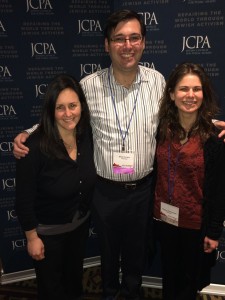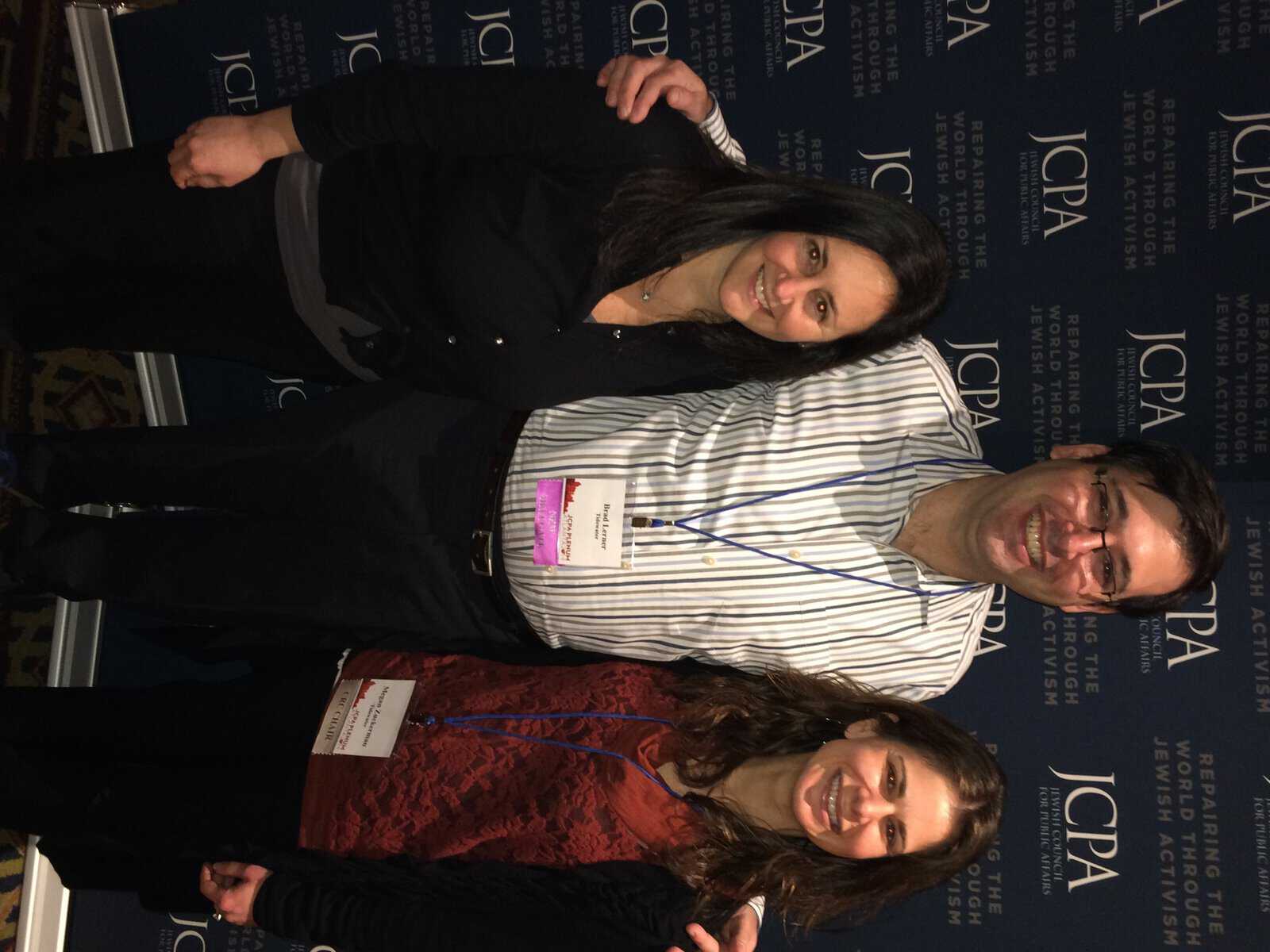
Robin Mancoll, CRC director; Brad Lerner, JCPA Frank Family Fellow and CRC media committee vice chair; and Megan Zuckerman, CRC chair. Photo: David Makovsky.
The Jewish Council for Public Affairs (JCPA) held its annual Plenum in Atlanta, Ga., March 8–11.
The Plenum is the annual conference for Jewish community leaders and representatives from 125 Jewish Community Relations Councils and 16 national Jewish agencies to gather, learn, debate, and vote on consensus policy. I attended as a “lay leader” as part of my involvement with JCPA through the Lois and Larry Frank Institute Fellowship. Robin Mancoll, director of United Jewish Federation of Tidewater’s CRC, and Megan Zuckerman, chair, also attended. The JCPA is Tidewater’s CRC’s umbrella organization.
I was able to meet up with some dear friends from the Frank Fellowship (a diverse group of eight from Indianapolis, Pittsburgh, Louisville, San Francisco and Atlanta). Lois and Larry Frank, two philanthropists from Atlanta, funded our program where young U.S. Jewish leaders visited Auschwitz-Birkenau and Israel. As I noted in an earlier article, the Franks gift was transformative. The Franks invited the Fellows to their home for dinner one night, and subsidized our Plenum trip, so their boundless generosity continued in Atlanta. I cannot thank them enough for the remarkable experience.
In one of the best Plenum sessions, David Makovsky, who recently joined the U.S. State Department peace process team (and past Tidewater CRC Israel Today speaker), spoke about the need for a twostate solution and the prospects for peace. Concerns like Iran and religious extremism are shared by Arabs and Israelis, and without the Palestinian conflict to divide them, they could begin to cooperate more. Support for two states for two peoples has been a bipartisan American goal for many years, according to Makovsky.
Of particular interest to me was the lively discussion on the implications of the 2013 Pew Research Survey about how Jews view themselves in the U.S.
The survey suggests that Jewish identity is changing in America, where one-in-five Jews (22%) now describe themselves as having no religion. In order to combat a growing ennui toward Jewry in America, a panel of experts (Elana Kahn-Oren, CRC director, Milwaukee; Jerry Silverman, CEO of Jewish Federations of North America; and Rabbi Deborah Waxman, president Reconstructionist Rabbinical College) offered several intriguing suggestions, including providing free early childhood Jewish education, increasing capacity of Jewish camps, attracting the birthright generation within the communities and better engagement within Jewish neighborhoods. As the father of young children, I loved the idea of subsidized Jewish preschool or the increased presence of Jewish camps. Hampton Roads could benefit from such initiatives should they gain traction or funding.
The challenges of the Pew study were discussed by Abe Foxman, Anti- Defamation League director. After warning of the costs to world Jewry if America retreated from the world stage, Foxman said that crucial to stemming the estrangement of today’s Jewish youth is stopping what he calls the ignorance of today’s youth. It is incumbent to explain why our concerns matter. Foxman also stated that Jews often have a truncated Jewish identity by over-emphasizing Bar/Bat Mitzvah as end point for Jewish education. This resonated with me since my own Bar Mitzvah was effectively the end of my formal Hebrew/Sunday school years.
I attended a break-out session on the topic of Judaism and public school curriculum. Since the Virginia legislature recently passed Senate Bill 236 on prayer in school, along with the controversy of Saturday make-up days for snow, this issue felt timely. Jews in Tidewater must remain vigilant that Jewish history/traditions and Israeli politics are not taught in our schools in a biased manner. This session taught me many strategies on how to address the sensitive church/state separation issue.
The JCPA resolutions process encouraged interesting discussion as far as new policies on human trafficking, the minimum wage, reproductive rights, inclusion and disabilities, international LGBT discrimination, and increasing government support for public higher education. I was impressed with the level of thought and consideration that goes into the resolution process.
I look forward to attending future Plenums!
by Brad Lerner

